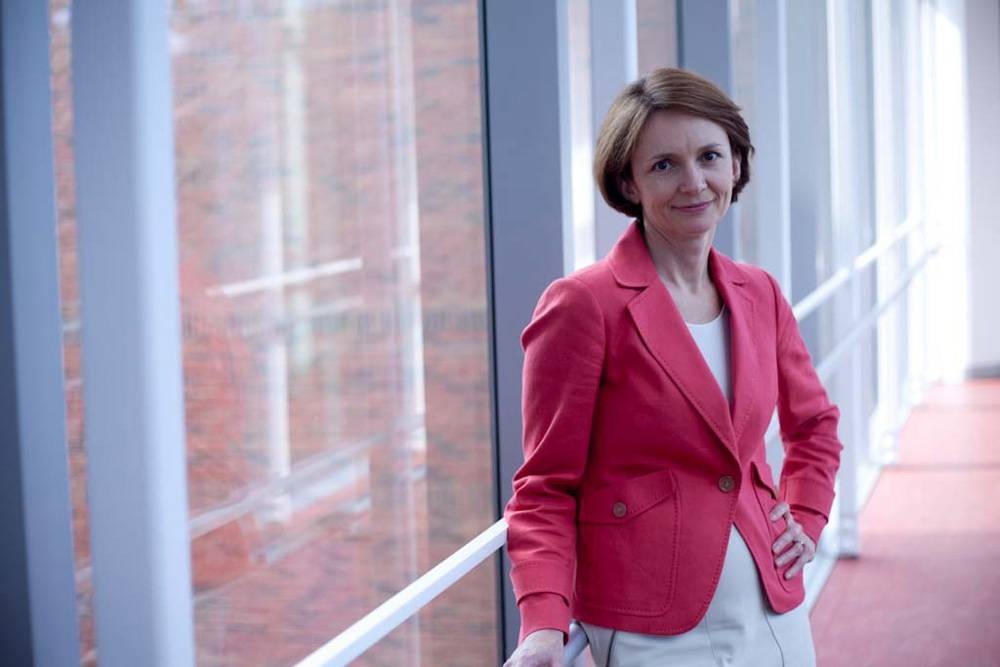Tracking Managerial Myopia
Katharina Lewellen studies how incentives impact CEOs.

Finance professor Katharina Lewellen shows how the vesting of CEO equity affects real investments and earnings.
Running a company these days isn’t what it used to be. With the advent of globalization and offshoring in the 20th century, firms competed in large part by cost-cutting and improving the efficiency of their operations. Innovation meant finding the cheapest factory to make your widget, or streamlining the supply chain through vertical integration.
Today, the game is more subtle. Cost-cutting has become commoditized—it’s an obvious practice that no longer differentiates firms, because they all do it. Now the challenge is real innovation—solving problems with new products and services, and guiding an organization to be more responsive to the quickly-changing world. Far from shaving pennies from an assembly line, this new form of innovation requires capital investments in research and development, employee training, and organizational development.
This investment-intensive environment presents a potential conflict for CEOs who get paid partially in equity and stock options. Investments in intangibles tend to reduce earnings, which can decrease a firm’s share price in the short term. A big question, therefore, has been whether or not CEOs manipulate earnings—by decreasing investments—to increase the short-term stock price when they plan to sell their stock in the near term.
As Tuck associate professor Katharina Lewellen shows in “Equity Vesting and Managerial Myopia,” a new paper co-authored with Alex Edmans of London Business School and Vivian Fang of the University of Minnesota, the empirical evidence suggests that managers do, in fact, manipulate earnings to increase stock prices when their own equity is about to vest, and thus the likelihood of stock sales goes up. Furthermore, the authors find, managers manipulate earnings by decreasing investments in things like R&D and advertising, which can injure firms’ long-term health.
Managerial myopia, defined as an action that boosts current earnings at the expense of long-term value, “has been a lively topic in finance,” Lewellen said. That’s because industry observers think myopia happens frequently, and surveys show it does, but it’s been very difficult to identify empirically. It all amounts to a lot of speculation about an important question: how does the structure of compensation affect a manager’s incentives to invest for the long run? This is significant not only for the growth of individual companies, but for the economy as a whole. A CEO with his eyes on the horizon of his stock options may, for example, turn down valuable investment opportunities or decide to forego a marketing campaign, which would translate to more immediate stock price gain but weaker performance a few years in the future.
The challenge was to reliably measure myopia. In their paper, Lewellen and her colleagues approached the problem statistically, using a new dataset that shows, among other things, when executives’ equity vests. The idea is that vesting should cause managers to liquidate at least some of their stock holdings in the near term, and thus increase their incentives to boost the short-term price. They then compared the equity vesting schedules to measures of long-term investment such as R&D and advertising. To bolster this evidence, the authors looked at how vesting relates to instances when the company beats analysts’ earnings forecasts by a narrow margin—another sign that earnings might be inflated. Finally, the authors studied market reactions to the earnings announcements, to see how it changed when a CEO’s equity vests compared to other times.
As the myopia theories and surveys indicated, the authors found that “firms reduce investment in years in which significant CEO stock and option holdings vest.” There are two possible reasons for this. One is managerial myopia: upcoming equity sales make managers more myopic, i.e., more focused on their firms’ short-term results. Another is an omitted variable that the study couldn’t capture, such as a board timing equity vesting to coincide with a period of low investment. The latter explanation seems less likely, the authors argue, because it would mean that boards could forecast investment opportunities years in advance—not an easy thing to do.
The authors’ second finding provides further evidence that managerial myopia is in play. They found that firms are more likely to beat analysts’ earnings estimates by a narrow margin when those earnings reports coincide with vesting times. “These results support the idea that vesting increases the CEO’s stock price concerns…” they conclude. Lewellen explains the dynamics further: “Managers really don’t like missing analysts’ earnings forecasts,” she said. “So it appears CEOs push earnings higher to coincide with (or just exceed) these forecasts.”
The third finding also bolsters the initial theory that managers do manipulate earnings to benefit their own pocketbooks. When the authors studied the market’s reactions to earnings announcements, they found that the announcement returns were significantly lower when firms had high levels of vesting equity. What’s going on here? In a word, market efficiency. “The stock market knows that CEOs manipulate, and the CEO knows that the market knows,” Lewellen said. “In effect, everyone expects some level of manipulation. What we are finding is consistent with this.” This conclusion, troubling as it may be, supports the classic theory of managerial myopia: the market’s reaction cancels out the managers’ tendency to exaggerate.
“This is interesting because we’re getting closer to understanding CEO behavior,” Lewellen said. “And when we know how CEOs respond to certain incentives, boards are better equipped to design compensation packages that will protect the long-term value of the firm.”
A. Edmans, V. Fang, and K. Lewellen, “Equity Vesting and Managerial Myopia,” working paper.
Alex Edmans is a professor of finance at the London School of Business. Vivian Fang is an assistant professor at the University of Minnesota.